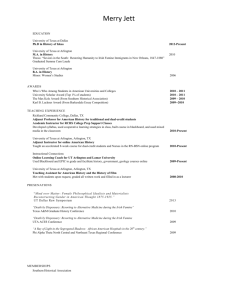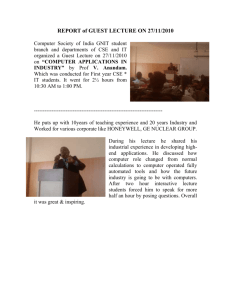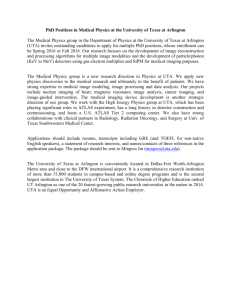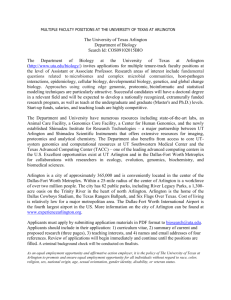Boa: A Language and infrastructure for analyzing ultra-large
advertisement
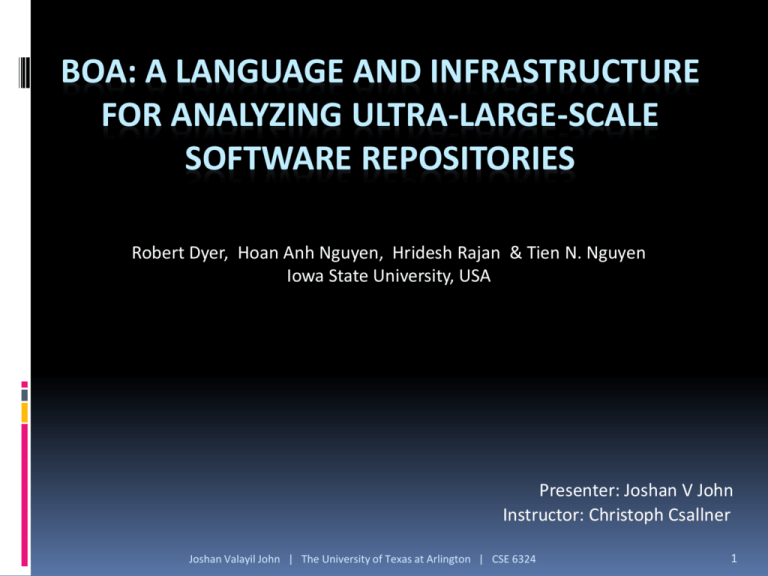
BOA: A LANGUAGE AND INFRASTRUCTURE FOR ANALYZING ULTRA-LARGE-SCALE SOFTWARE REPOSITORIES Robert Dyer, Hoan Anh Nguyen, Hridesh Rajan & Tien N. Nguyen Iowa State University, USA Presenter: Joshan V John Instructor: Christoph Csallner Joshan Valayil John | The University of Texas at Arlington | CSE 6324 1 Agenda Motivation Ultra-large-scale software repositories Barriers to mining software repositories Solution - Boa Goals of Boa Boa Architecture Evaluation Joshan Valayil John | The University of Texas at Arlington | CSE 6324 2 Motivation Big-3 software repositories known to have close to 1 million projects. Contains a wealth of software and information about software. Systematic extraction of relevant data from these repositories and their analysis for testing hypotheses is hard. Boa, a domain-specific language and infrastructure, developed to ease testing ‘Mining Software Repository’ related hypotheses. Joshan Valayil John | The University of Texas at Arlington | CSE 6324 3 Ultra-large-scale Software Repositories Joshan Valayil John | The University of Texas at Arlington | CSE 6324 4 Why analyze software repositories? Curiosity Identify patterns Forecasting Plan for better designs Empirical Validation Joshan Valayil John | The University of Texas at Arlington | CSE 6324 5 Barriers to mining software repositories Develop programming expertise to access version control system. Establish infrastructure to store downloaded data from software repositories. Develop an application to access this local data. Improve scalability of analysis infrastructure to process ultra-large-scale data. Joshan Valayil John | The University of Texas at Arlington | CSE 6324 6 Barriers to mining software repositories Experiments are often irreproducible Low reusability of experimental infrastructure Lack of systematic curation leads to loss of experimental data. Building analysis infrastructure to process ultra- large-scale data efficiently can be very hard. Joshan Valayil John | The University of Texas at Arlington | CSE 6324 7 Solution - Boa Designed a domain specific language and infrastructure to analyze ultra-large-scale software repositories – Boa. Joshan Valayil John | The University of Texas at Arlington | CSE 6324 8 Goals of Boa Easy to use Better abstractions Efficient & Scalable Enhances reproducibility Joshan Valayil John | The University of Texas at Arlington | CSE 6324 9 A Research Question Consider a program that answers: “What are the churn rates for all Java projects that use SVN?” Joshan Valayil John | The University of Texas at Arlington | CSE 6324 10 Solution in Java Full program over 70 lines of code. Uses JSON and SVN libraries. Runs sequentially. Takes over 24 hours. Takes almost 3 hours with data locally cached. Can be parallelized, but very complex. Joshan Valayil John | The University of Texas at Arlington | CSE 6324 11 Solution in Boa Simple program, 6 lines of code. Hides implementation specifics. Auto parallelization, results in 1 minute. Results can be easily reproduced by publishing these small programs with the data sets used. Joshan Valayil John | The University of Texas at Arlington | CSE 6324 12 Performance Results Joshan Valayil John | The University of Texas at Arlington | CSE 6324 13 Boa Architecture Joshan Valayil John | The University of Texas at Arlington | CSE 6324 14 Boa Architecture Three main components The Boa Language Boa Compiler & Runtime Supporting data infrastructure Joshan Valayil John | The University of Texas at Arlington | CSE 6324 15 The Boa Language Domain-Specific Types MapReduce Support Quantifiers User defined functions Output Aggregators Joshan Valayil John | The University of Texas at Arlington | CSE 6324 16 Boa Language – Domain-Specific Types Provides several domain-specific types which aid in abstracting mining software repository details (http://boa.cs.iastate.edu/docs/dsl-types.php) Joshan Valayil John | The University of Texas at Arlington | CSE 6324 17 Boa Language – MapReduce Support Computations specified via two user-defined functions: Mapper – takes key-value pairs as input & produces key-value pairs as output. Reducer – Consumes the above output and aggregates data based on individual keys. Joshan Valayil John | The University of Texas at Arlington | CSE 6324 18 Boa Language – Quantifiers Boa defines the quantifiers: exists foreach ifall Joshan Valayil John | The University of Texas at Arlington | CSE 6324 19 Boa Language – User-Defined Functions Users can define their own mining algorithms Facilitates code re-use. Joshan Valayil John | The University of Texas at Arlington | CSE 6324 20 Boa Language – Output aggregators Output can be indexed Output defined in terms of predefined data aggregators Joshan Valayil John | The University of Texas at Arlington | CSE 6324 21 Boa’s Supporting Infrastructure Compiler & Runtime Data Infrastructure Web based interface Joshan Valayil John | The University of Texas at Arlington | CSE 6324 22 Boa’s Compiler & Runtime Initial implementation was based upon the Sizzle compiler & framework Sizzle is an open-source Java implementation of the Sawzall language. Sizzle provides support for generating programs that run on the Hadoop open-source MapReduce framework. Joshan Valayil John | The University of Texas at Arlington | CSE 6324 23 Boa’s Data Infrastructure Local cache of repository information. First Step – Locally replicate data. Second Step – Run the caching translator to convert data into the framework required format. Input (JSON file + SVN repositories) -> Output (Hadoop SequenceFile) Joshan Valayil John | The University of Texas at Arlington | CSE 6324 24 Boa’s Web based Interface Submit programs. Compile & run them on their clusters. Each submission creates a job in the system. Joshan Valayil John | The University of Texas at Arlington | CSE 6324 25 Evaluation Programs were executed on a Hadoop 1.0.3 install. Cluster was not tuned for performance, except for setting the maximum number of map tasks for each compute node equal to the number of cores on that node and increasing the VM heap size. Joshan Valayil John | The University of Texas at Arlington | CSE 6324 26 Evaluation – Applicability Research Question 1 – Does Boa help researchers analyze ultra-large-scale software repositories? A set of 21 tasks in four different categories were examined. Programming Languages Project Management Legal Platform/Environment Joshan Valayil John | The University of Texas at Arlington | CSE 6324 27 Joshan Valayil John | The University of Texas at Arlington | CSE 6324 28 Evaluation - Applicability Joshan Valayil John | The University of Texas at Arlington | CSE 6324 29 Evaluation - Scalability Research Question 2 – Does the approach scale to the size of the cluster? Research Question 3 – Does the approach scale with the size of the input? Joshan Valayil John | The University of Texas at Arlington | CSE 6324 30 Evaluation - Scalability Joshan Valayil John | The University of Texas at Arlington | CSE 6324 31 Evaluation - Scalability Joshan Valayil John | The University of Texas at Arlington | CSE 6324 32 Evaluation - Reproducibility Research Question 4 – Using their infrastructure, can researchers easily reproduce previously published results? Joshan Valayil John | The University of Texas at Arlington | CSE 6324 33 Evaluation - Reproducibility Conducted controlled experiment Selected group of 8 researchers Each chose 3 tasks Joshan Valayil John | The University of Texas at Arlington | CSE 6324 34 References http://design.cs.iastate.edu/papers/ICSE- 13/icse13.pdf http://boa.cs.iastate.edu/docs/ Joshan Valayil John | The University of Texas at Arlington | CSE 6324 35 Joshan Valayil John | The University of Texas at Arlington | CSE 6324 36
